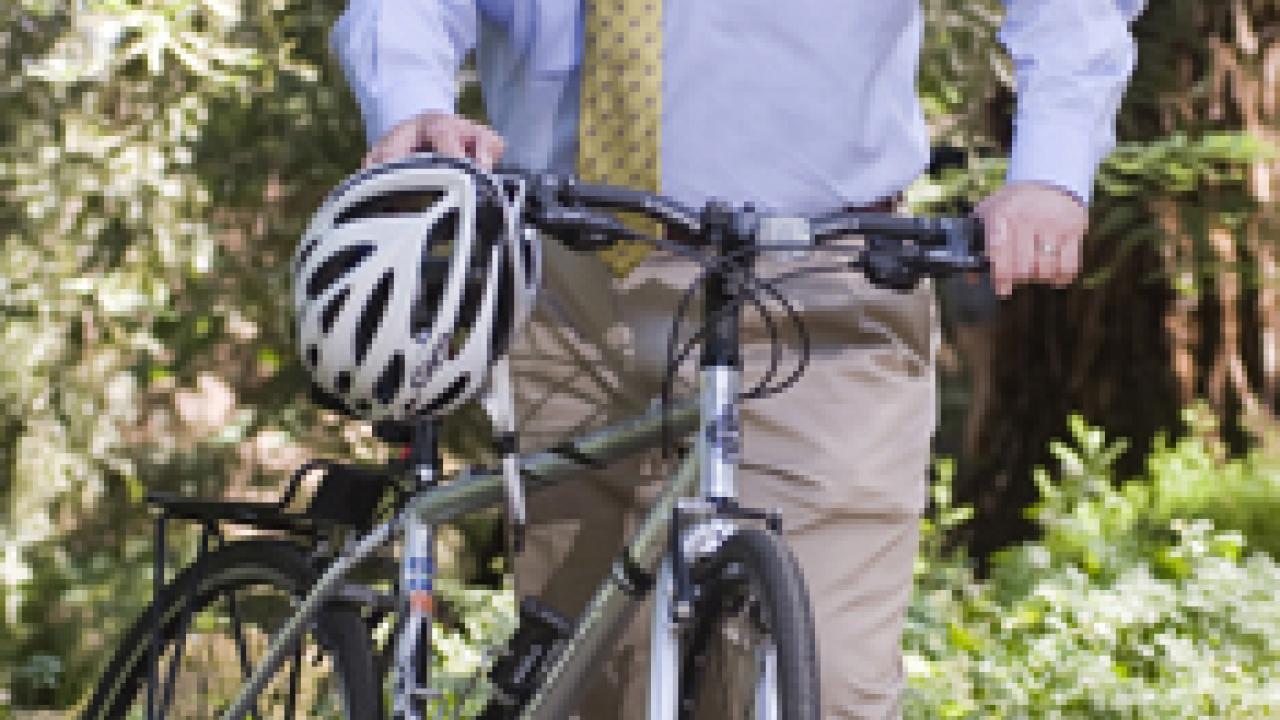It all began with a check box — Jeffery Gibeling’s career in graduate studies, that is.
Two decades ago, Gibeling, a junior faculty member, checked a box marked “Graduate Council” on an annual call for Academic Senate volunteers. After years of work on the council, he was appointed dean of Graduate Studies in 2002.
For Gibeling, leading the university’s efforts in preparing graduate students for careers is a deeply satisfying endeavor — he is a big believer in service.
Gibeling’s 25 years on campus include work as chair of the Davis Division of the Aca-demic Senate, chair of the Graduate Council, chair of the Biomedical Engineering Graduate Group, and close involvement in the graduate affairs of the Department of Chemical Engineering and Materials Science.
As senate chair, he promoted the interests of undergraduate students by creating the Undergraduate Council. His many contributions to graduate education include spearheading a systemwide project to extend health coverage for graduate students.
Recently he helped establish the Soderquist Matching Fund Initiative for Graduate Student Support. Thanks to a $500,000 gift from alumnus Charlie Soderquist’s estate, this initiative matches faculty-staff donations up to $25,000. He was one of the first faculty members to contribute.
For Gibeling, graduate studies is both a campus and a national issue. Last December, on behalf of UC Davis, he accepted the Educational Testing Service/Council of Graduate Schools Award for Innovation in Promoting Success in Graduate Education. The award recognized UC Davis’ proposal to develop a pilot program to “enhance faculty preparedness in the academic socialization and success of a diverse doctoral student population,” according to the national Council of Graduate Schools.
Gibeling was also chosen to serve as the 2010 chair of the Council of Graduate Schools’ board of directors.
Dateline recently sat with him for an interview:
What is the most important issue in graduate education today?
There are many, but these are two issues that I think are most prominent.
First, we need to engage a broader spectrum of graduate students. By broader spectrum, I mean increasing the number of underrepresented minorities and women, especially in science and engineering.
Second, we need administration and faculty to ensure success through mentoring and guidance, so that these students can complete their degrees. Completion rates for doctoral students are not high. Too often, life issues or lack of resources intervene and students leave their programs. In response to that, a UC Davis task force was established one year ago to examine this issue and promote better retention.
If you weren’t doing what you do now, what would you be doing?
Perhaps working at Sea World. When I was younger, I worked there during my summer vacations.
Did you swim with the animals?
No, I swam with people! I imagined myself in some type of park management position. It wasn’t a career, but working at Sea World, in the entertainment field, is very Californian.
What was your first impression of UC Davis?
At the time, I was visiting the College of Engineering in Bainer Hall, which was right next to the Hog Barn. I remember that as I was pulling into the parking lot ... the smell was particularly odoriferous.
I thought, Is this really where the engineering building is? But after that, I had a good, strong impression of how open and collegial people were. It was this sense of the “Davis Way” that appealed to me.
What is something people would be surprised to know about you?
As a way to keep mentally and physically fit, I ride about 75 to 100 miles per week, usually on the weekends. Recreational cycling is something I was interested in even before I encountered the Davis bike culture. As a teenager, I rode down the canyons in San Diego.
What do you consider your greatest achievement?
Helping students graduate. Every year at commencement, I am proudest of the work we do. I like seeing the students coming across the stage and I enjoy celebrating their accomplishments.
I especially look for those students who have come to us because they were confronted with certain challenges, and despite that, were able to complete their degrees. What motivates me is seeing the students we have helped.
Read any good books? Watch any good films lately?
There are two books about graduate education in my reading queue — Three Magic Letters, which refers to “Ph.D.” and Crossing the Finish Line, a book about completing college at a public university. I haven’t seen any films lately, but hope to see Avatar soon.
Who or what inspires you?
It was a Stanford professor, William Nix, during my undergrad years who really inspired me. I did really well on the first midterm, but not quite as well on the second midterm. When I got my blue book back, on the inside of the front cover that professor wrote, “I think you have a career in materials science.”
I was invited to do undergraduate research for him, which continued through graduate school and even into earning my doctorate. I still have that blue book!
It wasn’t just that this person did great science, but he was also a great mentor.
Do you have a personal motto?
Mine is a variation on the famous quote by the French chemist Louis Pasteur that “chance favors the prepared mind.” It is important to prepare yourself well and create opportunities.
I’ve always tried to prepare myself for the next opportunity — working at Sea World, which prepared me for a management role; having a professor who saw a future for me in the materials science field; and checking a box that began my career in graduate education. It seems somewhat random, but I was preparing myself for the future and creating new opportunities.
Nicole Nguyen is a Dateline intern.
Media Resources
Dave Jones, Dateline, 530-752-6556, dljones@ucdavis.edu
